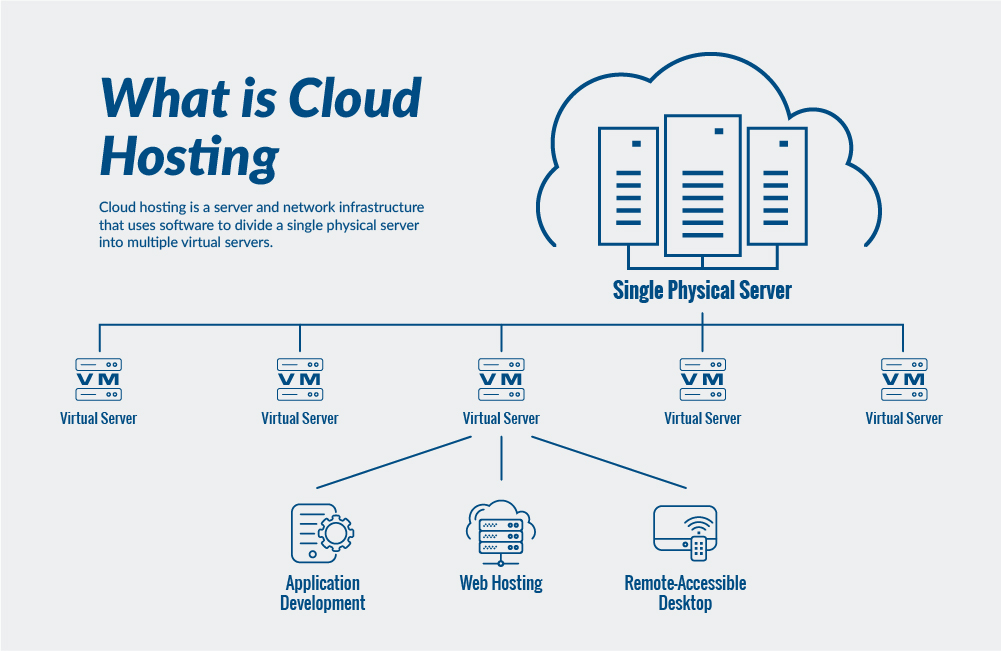
What Exactly Is a Cloud Server? A cloud server is a complex piece of hardware or software that can be real or virtual. It holds applications and processes data. It is made possible by a software called virtualization, which splits a physical server with no software at all into several virtual servers.
The Infrastructure as a Service (IaaS) paradigm is increasingly being used by businesses to manage workloads and store data. This enables them to remotely access virtual server services via an internet interface.
What Is the Function of a Cloud Server?
A cloud server hosts software and webpages on cloud servers, which are then made available to users. These solutions, unlike traditional hosting, are not installed on separate servers.
What does it imply? Applications and websites are kept in the cloud on a network of linked virtual and physical servers. As a result, they are more adaptable and scalable.
What Is the Distinction Between a Server and a Cloud?
There are a few examples:
- The cloud can be activated right away, whereas the server requires some time waiting.
- Traditional servers usually incur additional expenses since you must forecast the amount of electricity you will use in the future. If you do not use this electricity, it will incur expenses while providing no advantages. You don’t have to be concerned about such circumstances because a cloud server is more adaptable.
- You may dynamically divide the cloud’s resources based on your needs.
- The cloud is extremely adaptable, allowing you to effortlessly adjust RAM, CPU, or HDD. Traditional servers, on the other hand, can only be enlarged by increasing the number of HDDs and RAM.
- If you use a cloud server, you can quickly secure your data by performing a traditional backup or snapshot available only in the cloud.
- With a traditional server, you pay a fixed monthly membership fee regardless of the resources used. On the other hand, as a cloud user, you only pay for what you use because the cloud is scalable to your needs.
These are only a few examples of distinctions. You can check out some cloud hosting companies in your local region. Or, you can reach out to us at Covert SEO Agency to give you verified recommendations if you’re on the look for the best Cloud hosting company. And you should also remember that we are the best Australia SEO company that can give you top-notch SEO services to scale your business.
What Impact Does Cloud Hosting Have on SEO Strategy?
Now that you know what cloud hosting is, let’s talk about how it affects SEO Services. It turns out that choosing an adequate cloud server might affect your future placements in search results. This choice has a big effect on how long it takes for the server to respond, which is the same as how long it takes for a page to load.
Page loading speed is a crucial Google ranking criterion in 2022, as you are surely aware, and it has a significant influence on UX. After all, people become frustrated quickly and will quit your site if it takes more than 2 or 3 seconds to load. So, how does cloud hosting impact SEO? It certainly does! It can help your technical SEO efforts in a variety of ways. Continue reading to find out more.

Superior Hosting Locations
Keep in mind that website hosting isn’t totally digital since it also requires actual servers in physical places. When deciding which SERPs to show, Google gives websites that are close to the visitor more weight when deciding. What does it actually mean?
Even though your server is close to the user, your page may not be displayed highly if it meets all of the ranking parameters and relates to the query. Cloud hosting overcomes this problem by storing webpages on several servers in different regions. It gets rid of the need for page owners to have more than one domain so that they show up more often in search results.
Increased Dependability
To begin with, it is important to note that cloud servers are far more trustworthy than traditional alternatives. They don’t fail as frequently as you may think, and because your data is kept on several servers, it’s safer and easier to retrieve.
Aside from that, because traditional servers regularly fail, a cloud server may considerably enhance the uptime of your website. Users may still view your website from numerous servers if you use a cloud server, even if one or two of them are down.
It’s a significant benefit that distinguishes some businesses from the competition. Why? Because Google dislikes websites that are often down and tends to rank them lower.
Enhanced Page Load Speed
Page loading speed indicates how quickly your website will load. In other words, how long will the user have to wait for the material to appear? The quicker the page loads, the better.
The time it takes for a website to load has a direct influence on SEO. According to the official announcement issued by Google, website speed is vital for all Internet users, not just site owners. Faster sites produce happier users, and our own tests have shown that when a site responds slowly, visitors spend less time there.
So, what is the relationship between page speed and the server? Because cloud hosting makes use of a content delivery network, it may greatly improve website loading time. This helps both SEO and UX. Remember that people don’t like to wait and will probably leave your website if the information isn’t shown right away.

Improved Mobile-Friendliness
Because mobile users are increasing, Google prefers pages that are responsive and look good on smartphones and tablets as stated by SEO Heros. Mobile-friendliness is one of the ranking criteria that gained traction following Google’s June 2019 Core Update, when it declared that it would be paying even more attention to mobile-friendly websites.
So, what exactly is the link between cloud servers and mobile friendliness? The great majority of cloud hosting companies, on the other hand, provide excellent mobile analytics that may provide you with vital insights about your website’s features, such as its mobile layout.
Enhanced Security
Our final point will be about increased security. Cloud hosting usually offers a wide range of tools and software to stop bots from getting into your comment sections or copying your content.
Although these factors may appear trivial at first glance, it is important to note that such malevolent acts might harm your rankings. If you use a cloud server, your page will be fully safeguarded, which will benefit SEO. Aside from that, cloud hosting gives you peace of mind that your site’s data and the personal information of your users are safe.
The Bottom Line on Cloud Hosting and SEO
As you can see, cloud hosting is beneficial to SEO strategy. Although on-site and off-site actions have a significant impact on your SERP rankings, everything begins with website construction. As a result, it’s worth doing things correctly and selecting hosting companies that can secure your data, enhance page loading times, and make your site mobile-friendlier.
Do you need a proven SEO company assistance assessing the SEO ranking of your website? Choose P1 SEO Agency to learn what will make Google adore your page!
More to read:
What Does Google Think About “Quality Content”?





